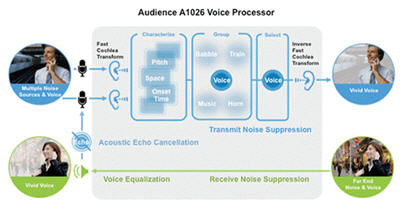 Those who’ve tested a Nexus One phone have raved about the phone’s ability to isolate a human voice from the racket of the big city. Much of the credit goes to a chip, the Audience A1026 voice processor, hidden inside the phone.
Those who’ve tested a Nexus One phone have raved about the phone’s ability to isolate a human voice from the racket of the big city. Much of the credit goes to a chip, the Audience A1026 voice processor, hidden inside the phone.
Google mentioned the Audience chip in its blog post on Nexus One launch day, but the post buried the news and focused on Google’s allegedly unique approach to selling phones.
I can’t see myself at a local bar raving to drunk patrons about Google’s innovative retail strategy. But this phone? You gotta try it. Leave the apps alone and try making a voice call with it. You won’t believe it. The Nexus One’s rock-solid voice quality may bring phone sex back to smartphone users.
![]() If you don’t have a Nexus One at hand, go to Audience’s demo page and play the A/B test clips of calls before and after real-time processing by the A1026. It’s amazing how the chip can bring out a human voice, and remove the nagging digital-network echoes that plague conference calls.
If you don’t have a Nexus One at hand, go to Audience’s demo page and play the A/B test clips of calls before and after real-time processing by the A1026. It’s amazing how the chip can bring out a human voice, and remove the nagging digital-network echoes that plague conference calls.
June 5th: The AI Audit in NYC
Join us next week in NYC to engage with top executive leaders, delving into strategies for auditing AI models to ensure fairness, optimal performance, and ethical compliance across diverse organizations. Secure your attendance for this exclusive invite-only event.
 A spokeswoman for the company said in an email, “Audience’s third generation voice processor is based on the intelligence of the human hearing system and offers a single, mixed-signal system-on-chip solution that integrates with two microphones in a mobile phone to uniquely identify the primary voice in conversation and eliminate surrounding noise. It also automatically adjusts voice volume and equalization during calls to adapt to local noise interference.”
A spokeswoman for the company said in an email, “Audience’s third generation voice processor is based on the intelligence of the human hearing system and offers a single, mixed-signal system-on-chip solution that integrates with two microphones in a mobile phone to uniquely identify the primary voice in conversation and eliminate surrounding noise. It also automatically adjusts voice volume and equalization during calls to adapt to local noise interference.”
Mountain View-based Audience was founded in 2000 and has received at least $15 million in funding, much of it from Paul Allen’s Vulcan Capital. Other investors include NEA, Tallwood Venture Capital, and Venture Tech Alliance. Founder Lloyd Watts studied audio processor chips under Caltech legend Carver Mead.
